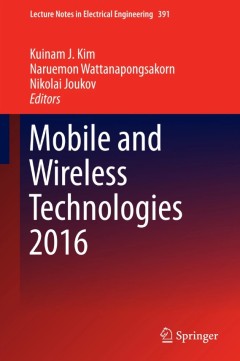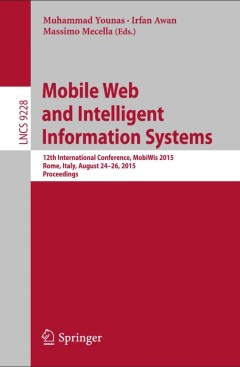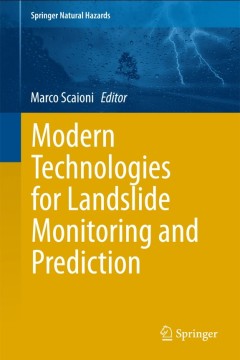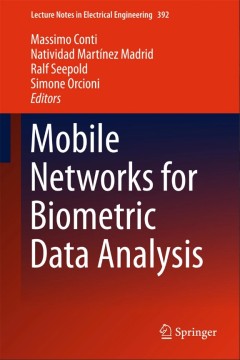Filter by

Mobile and Wireless Technologies 2016
This book presents the peer-reviewed contributions of ICMWT2016, an international conference devoted to mobile and wireless technology. Researchers and professionals from academia and industry met to discuss the cutting-edge developments in the field. The book includes papers on mobile and wireless networks, the increasingly important security issues, data management, as well as the latest deve…
- Edition
- 1
- ISBN/ISSN
- 978-981-10-1408-6
- Collation
- XIII, 252
- Series Title
- Lecture Notes in Electrical Engineering
- Call Number
- -

Mobile Web and Intelligent Information Systems
This book constitutes the refereed proceedings of the 12th International Conference on Mobile Web and Intelligent Information Systems, MobiWIS 2015, held in Rome, Italy, in August 2015. The 17 full papers and 3 short papers presented were carefully reviewed and selected from 55 submissions. The papers are organized in topical sections such as mobile services and applications; usability and visu…
- Edition
- 1
- ISBN/ISSN
- 978-3-319-23143-3
- Collation
- XVI, 229
- Series Title
- Lecture Notes in Computer Science
- Call Number
- -

Moving to Office 365:Planning and Migration Guide
This book takes a concentrated look at the very latest best practices for Office 365 migration, with a focus on the needs of senior managers, IT managers, and others involved in key decisions when moving their business to the cloud. Based on popular chapters in his first book, Office 365: Migrating and Managing Your Business in the Cloud (Apress Open, co-authored with Don Crawford), author M…
- Edition
- 1
- ISBN/ISSN
- 978-1-4842-1198-4
- Collation
- XX, 361
- Series Title
- -
- Call Number
- -

Modern Technologies for Landslide Monitoring and Prediction
Modern Technologies for Landslide Investigation and Prediction presents eleven contributed chapters from Chinese and Italian authors, as a follow-up of a bilateral workshop held in Shanghai on September 2013. Chapters are organized in three main parts: ground-based monitoring techniques (photogrammetry, terrestrial laser scanning, ground-based InSAR, infrared thermography, and GNSS networks), g…
- Edition
- 1
- ISBN/ISSN
- 978-3-662-45930-0
- Collation
- XII, 249
- Series Title
- Springer Natural Hazards
- Call Number
- -

Emerging Research in Computing, Information, Communication and Applications …
This proceedings volume covers the proceedings of ERCICA 2015. ERCICA provides an interdisciplinary forum for researchers, professional engineers and scientists, educators, and technologists to discuss, debate and promote research and technology in the upcoming areas of Computing, Information, Communication and their Applications. The contents of this book cover emerging research areas in field…
- Edition
- -
- ISBN/ISSN
- 978-981-10-0287-8
- Collation
- 111 b/w illustrations, 269 illustrations in colour
- Series Title
- -
- Call Number
- -

Emerging Research in Computing, Information, Communication and Applications …
This proceedings volume covers the proceedings of ERCICA 2015. ERCICA provides an interdisciplinary forum for researchers, professional engineers and scientists, educators, and technologists to discuss, debate and promote research and technology in the upcoming areas of Computing, Information, Communication and their Applications. The contents of this book cover emerging research areas in field…
- Edition
- -
- ISBN/ISSN
- 978-81-322-2553-9
- Collation
- 109 b/w illustrations, 257 illustrations in colour
- Series Title
- -
- Call Number
- -

Emerging Research in Computing, Information, Communication and Applications …
This proceedings volume covers the proceedings of ERCICA 2015. ERCICA provides an interdisciplinary forum for researchers, professional engineers and scientists, educators, and technologists to discuss, debate and promote research and technology in the upcoming areas of Computing, Information, Communication and their Applications. The contents of this book cover emerging research areas in field…
- Edition
- -
- ISBN/ISSN
- 978-81-322-2550-8
- Collation
- 87 b/w illustrations, 218 illustrations in colour
- Series Title
- -
- Call Number
- -

Modeling and Processing for Next-Generation Big-Data Technologies
This book covers the latest advances in Big Data technologies and provides the readers with a comprehensive review of the state-of-the-art in Big Data processing, analysis, analytics, and other related topics. It presents new models, algorithms, software solutions and methodologies, covering the full data cycle, from data gathering to their visualization and interaction, and includes a set of c…
- Edition
- 1
- ISBN/ISSN
- 978-3-319-09176-1
- Collation
- XX, 516
- Series Title
- Modeling and Optimization in Science and Technologies
- Call Number
- -

Mobile Phone Security and Forensics
Dr. Iosif I. Androulidakis has an active presence in the ICT security field having authored more than 90 publications (including 6 books) and having presented more than 120 talks and lectures in international conferences and seminars in 20 countries. Holding 2 Ph.Ds his research interests focus on security issues in PBXs (private telephony exchanges), where he has 20 years of experience, as…
- Edition
- 1
- ISBN/ISSN
- 978-3-319-29741-5
- Collation
- XI, 120
- Series Title
- -
- Call Number
- -

Mobile Networks for Biometric Data Analysis
This book showcases new and innovative approaches to biometric data capture and analysis, focusing especially on those that are characterized by non-intrusiveness, reliable prediction algorithms, and high user acceptance. It comprises the peer-reviewed papers from the international workshop on the subject that was held in Ancona, Italy, in October 2014 and featured sessions on ICT for health ca…
- Edition
- 1
- ISBN/ISSN
- 978-3-319-39698-9
- Collation
- IX, 323
- Series Title
- Lecture Notes in Electrical Engineering
- Call Number
- -
 Computer Science, Information & General Works
Computer Science, Information & General Works  Philosophy & Psychology
Philosophy & Psychology  Religion
Religion  Social Sciences
Social Sciences  Language
Language  Pure Science
Pure Science  Applied Sciences
Applied Sciences  Art & Recreation
Art & Recreation  Literature
Literature  History & Geography
History & Geography